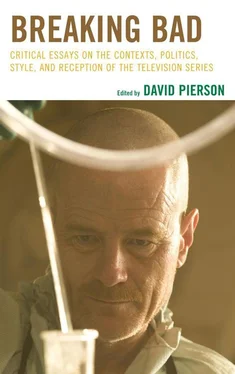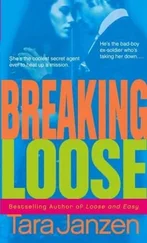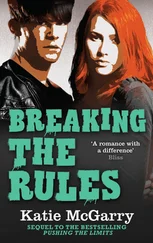Jesse is regarded by many as not much more than a fucked up junkie, with little moral or social worth. He has a well-established criminal record and his parents have long ago given up on him. When Jesse announces that he wants out of the meth business, Walter tells Jesse he does not have anything in his life and asks him when they can start back cooking again. Yet, unlike Walter, who can whistle contentedly minutes after hearing a news report about the missing boy they just liquefied in a jug of acid because he witnessed them robbing a train, Jesse is tormented with guilt by the deeds he has committed. Although Jesse knows that there is right and there is wrong, he is repeatedly overwhelmed with self-doubts about his ability to navigate moral terrain.
Jesse first begins attending rehab to manage his drug use and to deal with his feelings of guilt regarding the death of his girlfriend Jane. Later, unable to handle his guilt for killing Gale, Jesse once again lapses from sobriety and starts using crystal meth. Only after Mike forcibly takes Jesse from his home and keeps him clear of all drugs and alcohol is Jesse able to become sober. Still unable to come to terms with the murder of Gale, Jesse, in the episode “Problem Dog” (8/28/11), heads back to rehab for moral support.
Rehab is a place for abnormals: addicts, deviants, and society’s outsiders. Yet, the rules of this space make clear that, no matter how horrific their actions, they are rebranded as acceptable because, within that space, nothing is judged. Within that rehab space, abnormality is normality. The discussion leader tells everyone attending that they cannot change the past. Yet, Jesse finds himself so troubled by the gravity of the immoral actions he is directly responsible for, the latest being his murder of Gale, that he cannot even speak of them directly. Instead he tells the group he is pained because he has recently killed a dog, a “problem dog.”
Another person in rehab explains that meth is to blame for this action since using the drug can cause a person to go right back to a dark spot in life where he or she has no control over his or her actions. But Jesse rejects this pat explanation. He did not kill the problem dog because meth made him act rather he chose to do it. Moreover, he had options: he could have put an ad in the paper, dropped “the dog” off at the pound. He did not have to kill Gale. There are always choices. To this the discussion leader reminds Jesse that the group is not in a position to render moral judgments. But Jesse is not consoled with these words. Rather, he finds them deeply disturbing. He argues that even if you do nothing about it, this whole process is about self-acceptance and there is really no point to one’s actions. To further drive home his point, he mentions that he only came to rehab sessions to sell meth. Only at this point does the rehab discussion leader revise his policy about rendering moral judgments and acknowledge that such behavior is unacceptable.
Rather than seek comfort from such familiar platitudes as ‘it all happens for a reason,’ or ‘what’s done is done,’ [12] When Skyler lamented the guilt she felt for her role in Ted Beneke’s injuries, Walter tried to comfort her by saying that she made a misstep and lost control over the situation. He explained to her that such actions did not make her a bad person, but instead made her “human.” She immediately dismisses such words as flawed rationalizing. The implication is clear: Walter has learned to rationalize moral horrors.
Jesse insists on the acknowledgement of right and wrong. But in doing so, he must acknowledge, both to himself and others, that he has committed acts that are profoundly wrong, acts that cannot be undone. Moreover, the guilt he will feel for what he has done will, in all likelihood, never abate. But in taking full responsibility for his actions he will gain a sense of self as a moral person, as someone who has not only committed profoundly immoral actions, but also of someone capable of tender, loving relationships and doing good deeds, such as taking care of his aunt in her final days while she died of cancer, his love for Jane, financially securing Andrea and Brock, and his loyalty to Walter and Mike. Jesse, despite being nothing more than a socially deviant user, nonetheless demanded and obtained moral agency along with full moral accountability as well as the privilege to make moral judgments.
Tobin Siebers (2008) elaborates on how people perceive their lives,
Most people do not want to consider that life’s passage will lead them from ability to disability. The prospect is too frightening, the disabled body, too disturbing. In fact, even this picture is too optimistic. The cycle of life runs in actuality from disability to temporary ability back to disability, and that only if you are among the most fortunate, among those who do not fall ill or suffer a severe accident. (60)
Able-bodied people like to think of themselves as essentially able-bodied: once able-bodied, always able-bodied. We grow and work and play within a culture that markets immortality with creams, pills, and surgeries. If we accept the myth of control, we are accepting the idea that we can stave off illnesses, even our own death. Yet we know that cannot possibly be true. But, as Siebers claims,
[T]hat we embrace these contradictions without interrogating them reveals that our thinking is steeped in ideology. Ideology… sutures together opposites, turning them into apparent complements of each other, smoothing over contradictions, and making almost unrecognizable any perspective that would offer a critique of it. (8)
We cling to these contradictory thoughts about our bodies, about sickness and health, because we do not want to face the reality of bodies.
Because the truth of the matter is that impaired, diseased or dying bodies sometimes seem to have plans of their own, independent of what we wish them to do. Cheryl Marie Wade (1994) defends what is referred to as a bodily realism, an approach advocated by some disability studies scholars. Wade asserts that only the use of blunt language, shockingly detailed, completely frank and uncensored descriptions of bodily functions and bodily dependence are the way to end our collective fear of disease and disability. Because so long as we refuse to acknowledge the reality of bodily needs, so long as we are ignorant of disabled bodily reality, we will live in fear of those realities. Wade argues that the only way we will ever “be really at home in the world” is if we first use “real language” to discuss these “crude realities” (88-90).
Sick, diseased and impaired bodies can so terrify the able-bodied that they will refuse to even consider the possibility that such bodies exist, or that one day they could have a body like that. But the more disabled are treated as the Other, the more the able-bodied avoid confronting those blunt, crude realities, the more terrifying disability looms in the imagination of ability ideology. It is for that reason that Wade insists that we should talk about these realities. But why should we confront these horrors? Why not just shut them away? Because, according to Wade, this is our world, our home and the way we live in it and if we are to have any hope to be at home in it, then we must confront the truths, not only that some bodies are “not normal,” but that what is now able-bodied may someday become “not normal.” Perhaps the most fortuitous effect of “saying these things out loud” is that the able-bodied will come to realize that most disabled people do not regard their lives as not worth living. Many disabled regard their disability as part of their identity and as a source of pride (Siebers 2008; Wendell 1996).
Читать дальше












